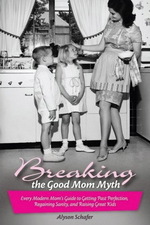Should Spanking Still Be Legal In Canada?
By Alyson Schafer, a psychotherapist and one of Canada's leading parenting experts, December 2007.
In light of the Canadian Supreme Court's recent ruling (this article was original posted on February 13th, 2004) on Section 43 of the criminal code, I would like to share a few of my own thoughts on the issue of spanking.
- Spanking equals hitting. Let's stop using words that pretty up the act to hide reality.
- Hitting is ineffective as a form of discipline.
There are two kinds of children, those who respond to being hit by correcting their behaviour, and those who don't.
Responders - The child that responds to the hitting would have responded to other forms of correction. There are other effective forms of correction that aren't at the expense of the child's esteem and don't hurt parent-child relationships.
Non-Responders - The child that does not respond to being hit, in fact rebels against the physical transgression to prove that it doesn't control them, thereby retaliating and often making the next transgression worse. They hold in tears of pain or laugh at the parent who in vein tries to "get through to them" by hitting progressively harder, only to produce a child that is motivated to retaliate yet again. It's a vicious, escalating cycle.
People hit children because they are bankrupt of ideas on what else to do, not because they think it is the best thing to do. People need to learn alternative methods of child guidance through parent education classes that teach adults to understand the motivations and discouragements within the misbehaving child. Parents need to get to the root of the problem, rather than resorting to reactive short-term "fixes" of punishment and discipline. Governments should fund parent education just as they fund pre-natal education.
Now my two cents on the Supreme Courts' ruling. If you have not been following this case, here is a summary.
The Supreme Court has ruled that:
- Parents can use appropriate and reasonable force and restraint for the purposes of correcting / teaching a child,
- The parent must act in a cool and rational way, not angered,
- The force must not be degrading or humiliating or harmful, and,
- The child must be older than 2 years and younger than 12 years of age.
While this is now a more restrictive interpretation of the law than was previously in place, I ask would ask the Justices how the remaining elements add up to anything that will effectively change a child's behaviour.
If the blow is weak so that it meets the law's criteria for not degrading the child, how exactly does the court think this measure will influence behaviour?
If it is so weak as to not be degrading, why do they exclude children older than 12 year? The court reasoned that this type of correction would promote rebellion and antisocial behaviour. How could an adult acting reasonably and treating a child "reasonably" and not "degradingly" bring that about?
I feel that the ruling essentially speaks from both sides of its mouth. Hitting is punitive and the punitive is by nature degrading. It affects all humans the same regardless of age. We once believed that husbands could use "reasonable force" to control their wives too. And no doubt some people and some religions feel this is still the case, but our laws have progressed to recognize that this is not the case. We must now show that society must find alternatives to hitting children in a vain attempt to correct them. All humans are social equals and this should be reflected in the law - regardless of age.
I will close by acknowledging the dissenting opinion of Justice Binnie whose comments I agree with. Justice Binnie's dissent is partially captured here:
"A child is guaranteed "equal protection and equal benefit of the law" by s. 15(1) of the Canadian Charter of Rights and Freedoms. Section 43 of the Criminal Code, R.S.C. 1985, c. C-46, denies children the protection of the criminal law against the infliction of physical "force" that would be a criminal assault if used against an adult. The sole reason for children being placed in this inferior position is that they are children."
"Notwithstanding these facts, my colleague, the Chief Justice, is of the view that the equality rights of the child are not infringed by s. 43 because "a reasonable person acting on behalf of a child . . . would not conclude that the child's dignity has been offended in the manner contemplated by s. 15(1)" (para. 68). With all due respect to the majority of my colleagues, there can be few things that more effectively designate children as second-class citizens than stripping them of the ordinary protection of the assault provisions of the Criminal Code. Such stripping of protection is destructive of dignity from any perspective, including that of a child. Protection of physical integrity against the use of unlawful force is a fundamental value that is applicable to all. The "dignity" requirement, which gathered full force in this Court's judgment in Law v. Canada (Minister of Employment and Immigration), [1999] 1 S.C.R. 497, provides a useful and important insight into the purpose of s. 15(1), but it should not become an unpredictable side-wind powerful enough to single-handedly blow away the protection that the Criminal Code would otherwise provide."
You can review the full ruling if you'd like details on the courts decision. click here



